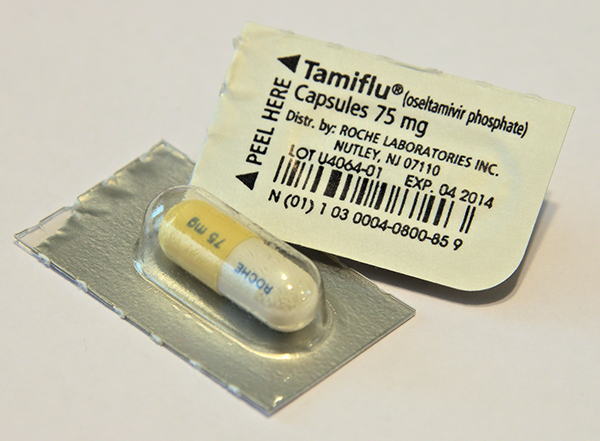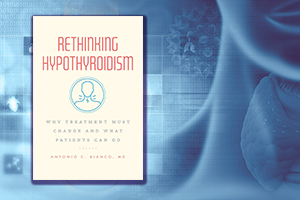



| By Dr. Ronald Hoffman

In the wake of last week’s newsletter article in which I questioned the flu vaccine, I was disheartened by a subsequent commentary in Medscape entitled “Are ‘Vaccine Skeptics’ Responsible for Flu Deaths?”
The tagline was “Some experts say anti-vaccine lobby took over messaging about flu vaccine”. I’m not a member of any “lobby” and would be delighted to report that the flu vaccine works and has no downsides. Some of these “experts” believe the public is so gullible and medically illiterate that they can’t handle the truth. I guess they think that the facts about the vaccine’s poor performance need to be better “managed” through more effective media campaigns. They claim that antivaxxers are responsible for the needless deaths of many unvaccinated people.
At the risk of being labeled a baby-killer, I can’t stay silent about the marginally effective—and side effect-ridden—antiviral drug Tamiflu. As with the vaccine, its promoters are losing the messaging war, too. Notwithstanding misleading headlines like “38-Year-Old Teacher Died After Not Getting Flu Meds Due To High Price, Husband Says”, the drug’s ability to prevent death or even serious flu complications is questionable, as we’ll soon see. A random survey of headlines about Tamiflu is overwhelmingly negative:
“Mounting Tamiflu terrors: Girl, 11 saw ‘the portal to HELL’ and had to be hospitalized for three months after she was treated for the flu” —Daily Mail, UK
“My kid nearly jumped out of window while tripping on Tamiflu” — New York Post
“Father warning other parents about scary side effects of Tamiflu” — FOX59
“Parents warn their children are having hallucinations, threatening suicide while taking Tamiflu” – TheIndyChannel.com Indianapolis
Paradoxically, there’s been a run on Tamiflu, according to GoodRx.com:
“In what appears to be the worst flu epidemic in years, prescriptions for Tamiflu are soaring – outpacing last year’s prescriptions by a factor of 10 or even 14 times higher this year in some states, with a nationwide rate that is more than 5 times higher than last year.”
Shortages are appearing in some areas, and hospitals are having trouble stockpiling enough for critically-ill patients. Patients and their doctor enablers are swallowing the premise that Tamiflu, if taken early enough in the course of a flu (within 48 hours of onset of symptoms), will shorten or lessen the severity of the flu, even reduce the risk of hospitalization or death.
As did all New York physicians, I received the following urgent electronic advisory from the New York State Department of Health: “Antiviral treatment is recommended as early as possible for patients with confirmed or suspected influenza who are hospitalized, seriously ill, or at high risk of serious influenza-related complications.”
But is there evidence that those claims are justified?
Tamiflu has been a controversial drug almost from the time of its introduction nearly 2 decades ago. In a 2017 editorial entitled “Evidence of the Minimal Benefit of Oseltamivir (Tamiflu) is Now 18 Years Old”, the British Medical Journal applauded the decision of the World Health Organization (WHO) to downgrade its recommendation of Tamiflu. WHO stated: “The original US Food and Drug Administration (FDA) approved professional product label indicated only a modest clinical benefit for the drug in reducing the duration of flu symptoms, a little more than a day.” Moreover “[Tamiflu’s] professional product label was amended in 2000 to reflect that there was no evidence that the drug would prevent the complications of influenza.” The marketing authorization for Tamiflu contained no information that it would reduce serious sequelae of the flu, secondary bacterial infections like pneumonia, bronchitis, sinusitis or otitis media.
Moreover, much has been written about Roche’s withholding of trial data on Tamiflu’s efficacy, which some consumer advocates have called out as a virtual case study of BigPharma deception.
After exhaustive study of numerous research trials—many of which were plagued with drug company sponsor bias—the authoritative Cochrane Collaborative concluded that Tamiflu could not be demonstrated to reduce flu symptoms by more than a day; there was no significant impact on the rate of hospitalization. There wasn’t enough data to determine whether it could reduce the flu death rate—hence the disingenuousness of the headline that said a woman died because she couldn’t afford the drug. Finally, there is no evidence that it can help curtail the spread of the flu.
Nevertheless, in the wake of pandemic scares like that of 2009, governments were stampeded into stockpiling tens of millions of doses of Tamiflu, delivering a sales bonanza to Roche.
As to side effects, they’re well-acknowledged. Roche initially whitewashed these, as it reported in one early trial: “There were no drug-related serious adverse events.” But reports of nausea, vomiting and psychiatric events soon emerged. Statistics are a little hard to visualize, but one expert estimated:
“If a million people take Tamiflu in a pandemic, 45,000 will experience vomiting, 31,000 will experience headache and 11,000 will have psychiatric side-effects. Remember, though, that those figures all assume we are only giving Tamiflu to a million people: if things kick off, we have stockpiled enough for 80% of the population. That’s quite a lot of vomit.”
How’s that for an apocalyptic scenario?
Bottom line: We’re placing too much reliance on a drug with marginal benefits and well-documented side effects. Even if you manage to score some from your doctor within the 48-hour critical period after the first onset of symptoms during which it may have slight efficacy—a dubious proposition given how cumbersome it can be to get prescriptions these days—is it worth the side effects? Would you give it to your young child who is inherently less resilient to its mind-bending effects? Did Tamiflu turn out to be a lifesaver for the scores of patients who succumbed to the flu this season, undoubtedly after being dosed, as a last resort, with intravenous Tamiflu?
We can and must do better. Meanwhile, deceptive messaging that suppresses the truth about Tamiflu does not advance the cause of public health. We mustn’t heed those who want to double-down on an epic-fail.
ADDENDUM: As of publication, Japanese health authorities have just announced approval of a “one-day” antiflu drug—Xofluza. Sounds promising, but let’s keep our powder dry while awaiting post-marketing studies evaluating its effectiveness and side effects.
I want to let all my readers know that I’ve heard your requests for focused advice on immune-bolstering supplementation loud and clear. In response, I’ve created the Intelligent Medicine Seasonal Immune Support Protocol – a curated list of my top recommendations for helping you keep your immune system in its best shape during this trying time of year. These are the same supplements I recommend to my patients and use myself. You can check out the protocol here.
Though we think of declining estrogen as the hallmark of menopause, it's actually common for…

Up to 12 percent of Americans have ulcers at some point in life. Peptic ulcers…
Gallbladder disease is a modern illness. An estimated 20 million Americans have gallbladder disease. The…

Dr. Antonio Bianco, recipient of the American Thyroid Association’s John B. Stanbury Thyroid Pathophysiology Medal,…

There’s a misconception among low-carb dieters. Many people believe a low-carb diet is much higher…

New, more powerful weight loss drugs: Drugs like Wegovy, Rybelsus, Ozempic and Mounjaro/Zepbound are revolutionizing…

Unraveling Magnesium’s Vital Role in Your Health with Patrick Sullivan, Part 1

Our virtual voicemail is open 24/7, so there's no need to wait to submit your questions for Dr. Hoffman. Leave a message, and you may hear your question featured on the Intelligent Medicine radio program!